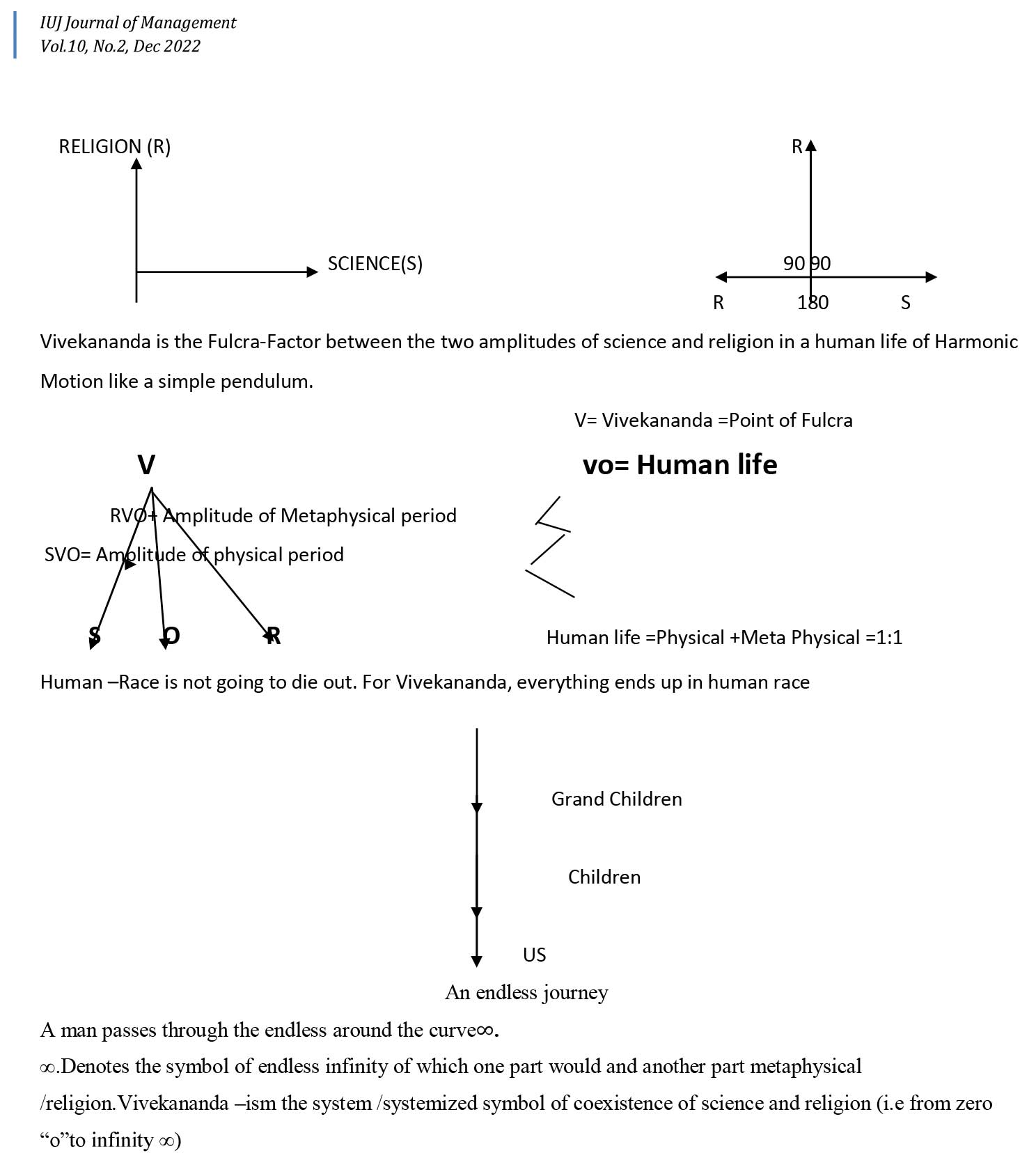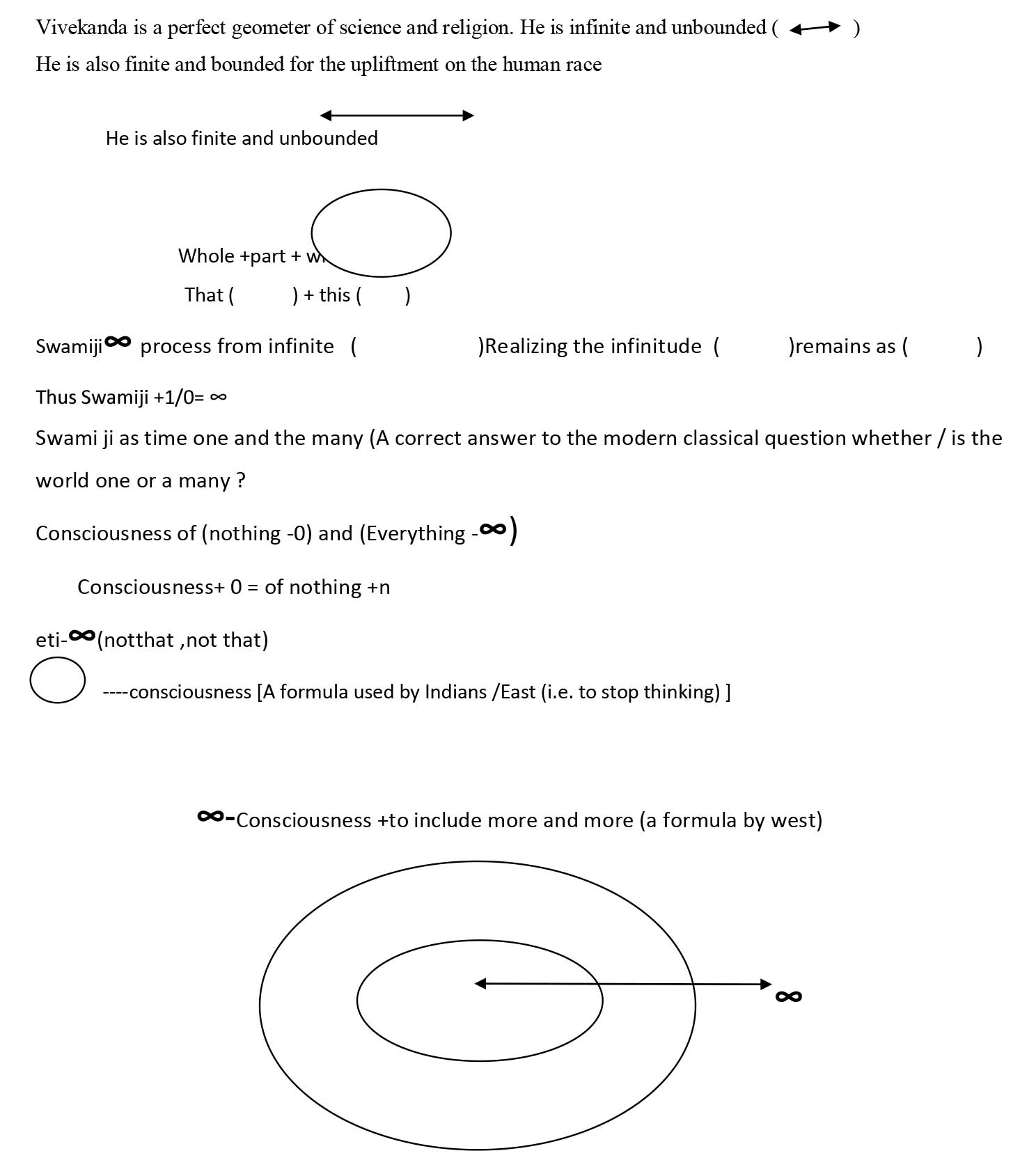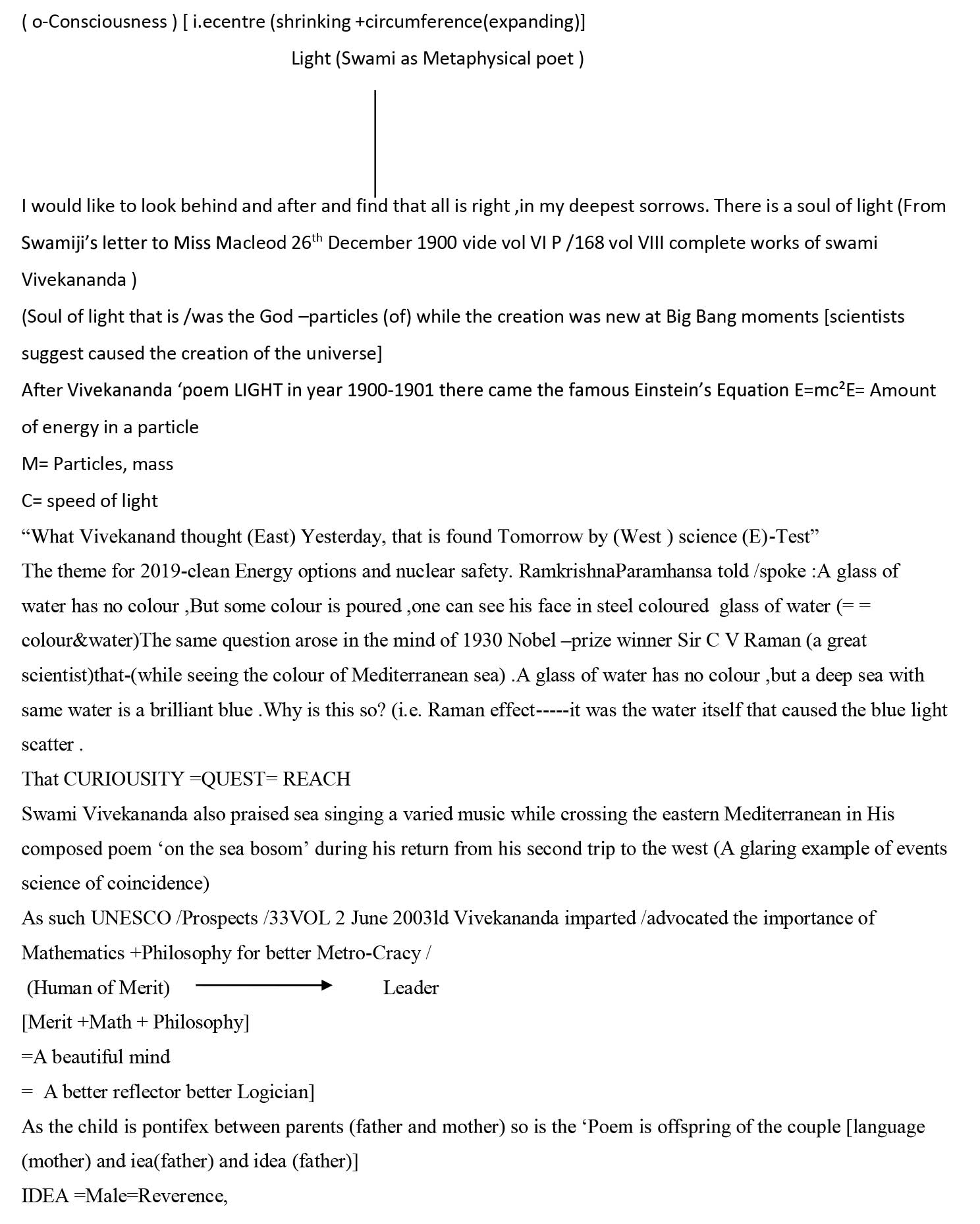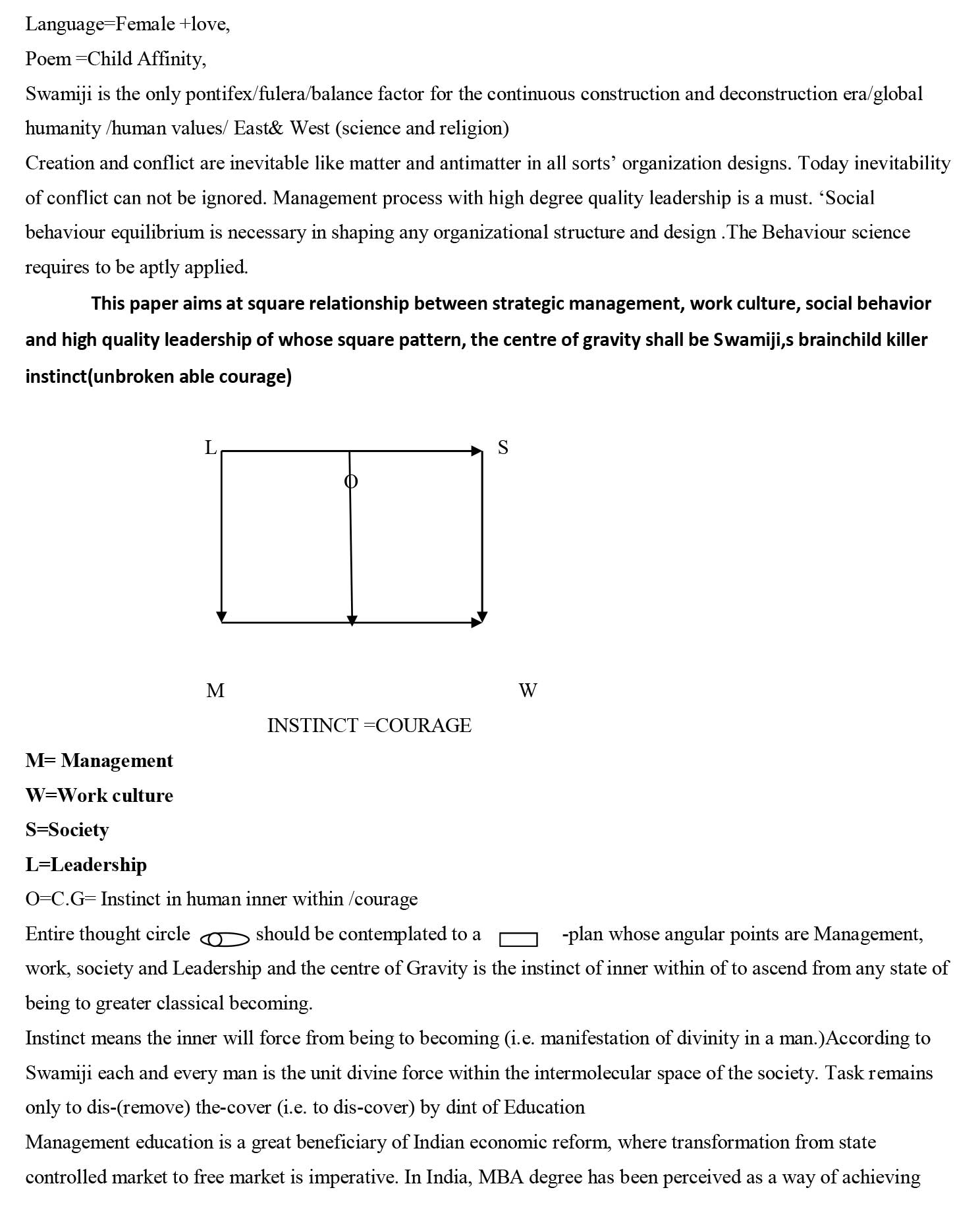Subscribe now to get notified about IU Jharkhand journal updates!
Vivekanda As Pontifex Between East And West And His Leadership Strategies
Abstract :
Vivekananda was/is the perfect geometer/pontifex between the east and the west .i.e. religion and science. Swamiji is the fulcra factor between O-consciousness and infinity consciousness' consciousness stands for east formula and infinity consciousness (i.e more and more) stands for west formula.Vivekananda sensed the soul of light in deepest sorrow in human life journey whereas after Him scientist Einstein in his unique equation E=MC²discovered the speed of light as God particle.Vivekananda while crossing the Eastern Mediterranean sea composed the poem on the sea's bosom the music as the colour of human life which was subsequently discovered by Sir C V Raman in the year 1930( won the Nobel prize) which was subsequently discovered by scientist Einstein and C V Raman .So Swamiji is the midpoint of two unbounded East and West.Vivekananda also own the appeal on 10 Nov 1887.Hereby I say Vivekananda above court case courage =killer instinct=I would not leave out (i.e remain in pain, then enjoy the pas-time =To come over the conflict=Total down the Earth= Firewater =Pain+ pas-Time9i.e the real acid –test of life/classical example of leadership Appliance in management process/social behavior science. This paper shows relationship Vivekananda as the role leader of our country.
Keywords :
Vivekananda,geometer/pontifex,management process,social behavior science.1. Introduction
Swami Vivekananda was/is the 'PONTIFIX' between East and West (East for Religion West for Science) Pontifix often interpreted as a compound originally meaning "bridge-maker " from pons(bridge')+....pontifex m (genitive pontifical).So Swamiji is the bridge maker with East and West.
I would like to denote science as "C" English alphabet letter something like incomplete and for religion I like to use the letter "O" which indicates complete. My attempt to show that 'science 'and religion both arw supplementary and complementary to each other.




Instinct means the inner will force from being to becoming (i.e. manifestation of divinity in a man.)According to Swamiji each and every man is the unit divine force within the intermolecular space of the society. Task remains only to dis-(remove) the-cover (i.e. to dis-cover) by dint of Education Management education is a great beneficiary of Indian economic reform, where transformation from state controlled market to free market is imperative. In India, MBA degree has been perceived as a way of achieving assured careers and sound wages at early stage of life. The ambition of Indian youth today is to get a job in the business, industrial or service sectors and settle down well as early as possible.
No doubt management education is needed an infusion of professional ability but the given value to society is equally important. Unfortunately, Management education in India has been so distorted and diluted in its execution as to lose nearly all the social intent.
In whole spectrum, the role of intuition, value and social recognition gets short shrift in the Management education. Emphasis is only on the knowledge content, on which examination is conducted. All other useful knowledge areas and skills are vastly neglected. Like spiritual knowledge does not find an appropriate place in the curriculum. Therefore students have no opportunity to know about their faith, culture and values. The knowledge they gain is mainly bookish and is not backed by practical experience.
Swami Vivekananda who was a Great Innovator of Management Values has laid mammoth emphasis on 'Value Based Management'. In today's context it has big relevance especially when we observe that the business world is plagued with various scams. Many business organisations only focus on earning profits, i.e. in other words the management of the organisation tends to ignore the interests of various stakeholders and only concentrate on generating mammoth profits. But it is imperative to comprehend that a business does not function in isolation. There are various internal and external factors that drive the business.
To ensure that a business organisation attains excellence in its journey, it is crucial that the management give importance to compliance of various laws / regulations in order to avert any fiasco, thereby, creating an environment of trust among the stakeholders. In this regard, the Governance Professionals, i.e. Company Secretaries have a big role to play. Being the connoisseur of corporate laws, capital market laws, labour laws, tax laws etc. a Company Secretary may play a pivotal role in ensuring compliance to the mentioned laws, thereby, providing an impetus to good governance practices.
As the New Companies Act, have elevated the role of the Company Secretary as Registered Valuer; Insolvency Practitioner; Key Managerial Personnel etc., their responsibilities have enhanced immensely and so ensconcing the teachings of Swami Vivekananda is a must for attaining excellence About a century ago, Swami Vivekananda had envisioned a vision on education and had categorically pointed out that true education is not the amount of information that is put into one's brain. The human mind is not a bottomless dry well, which has to be filled in with buckets of information by the teacher. He had said that education has more to do with assimilation of ideas and developing 'a mind of the same material as that of which the thunderbolt is made'. He suggested, was to be done with the help of 'Western science coupled with Vedanta … and faith in one's own self' Thus conclude that management Education is the brain child of Swamiji Swamiji already found the "God –particle' in each human being. But without a proper Management under a right upright Leadership a Work system cannot be streamlined in order to set up and regain social equilibrium-justice in a human society. To Swamiji everything ends up in the Human Race. Without a Man, nothing is important.

Management science is like a coordinate Geometry whose x-axis and y-axis are the organization and control .Its origin is undoubtedly the greater intellect/beautiful mind. For a beautiful mind can only beget a beautiful merit. And a beautiful merit can manifest a systematic organizational behavior in order to bring about a perfect democratic social Equilibrium in terms of all religious harmony.
The Idea of social justice rests upon the Maxima and Minima the injustice. For injustices are visible.Minimizethe injustices/disparities from a society, better the administration of justice. Thus administration of justice is directly proportional to the Minimization of injustices.Swamiji dreamt of classes' society/Total upliftment of the downtrodden section of the society, as the main pulse of the sociology/social science
As we can see that Jamshedji Tata was reportedly influenced by Vivekananda to establish the Indian Institute of Science—one of India's well known Research University—during their conversation as fellow travelers on a ship from Japan to Chicago in 1898. Abroad, Vivekananda had some interactions with Max Müller. Scientist Nikola Tesla was one of those influenced by the Vedic philosophy teachings of the Swami Vivekananda. On November 11, 1995 a section of Michigan Avenue, one of the most prominent streets in Chicago, was formally renamed "Swami Vivekananda Way".
In many institutes, students have come together and formed organizations meant for promoting discussion of spiritual ideas and the practice of such high principles. Many of such organizations have adopted his name. One such group also exists at IIT Madras and is popularly known as Vivekananda Study Circle. Another one exists at IIT Kanpur by the name Vivekananda Samiti. Additionally, Swami Vivekananda's ideas and teachings have carried on globally, being practiced in institutions all over the world.
In 2011, during the anti-corruption Lokpal billmovement, the prominent figure and Gandhian activist Anna Hazare repeatedly mentioned that he was greatly inspired by Swami Vivekananda's thoughts .In January, 2012 the Airport in Raipur was renamed as Swami Vivekananda Airport.
After a chance meeting between Jamsetji N. Tata and Swami Vivekananda on a ship in 1893 where they discussed Tata's plan of bringing the steel industry to India, We can challenge Swamijis remembrance Tata wrote to Vivekananda five years later:
"I trust, you remember me as a fellow-traveler on your voyage from Japan to Chicago. I very much recall at this moment your views on the growth of the ascetic spirit in India... I recall these ideas in connection with my scheme of Research Institute of Science for India, of which you have doubtless heard or read"
Impressed by Vivekananda's views on science and leadership abilities, Tata wanted him to guide his campaign. Vivekananda endorsed the project with enthusiasm, and Tata, with the aim of advancing the scientific capabilities of the country, constituted a Provisional Committee to prepare a plan for setting up of an Institute of research and higher education. The committee presented a draft proposal to Lord Curzon on 31 December 1898. Subsequently, Sir William Ramsay, a Nobel Laureate, was called on to propose a suitable place for such an institution who suggested Bangalore as the best location. Thus we see how Jamshedji was inspired by Swamiji
"Many of us today are caught in a fierce struggle in our work life where we go through several bouts of stress, pressures and precarious decision making hinged on ethics. Swami Vivekananda has some pearls of wisdom which could be well applicable to the work culture of today's corporate world."
Asserted by Swami Vivekananda
"When you are doing any work, do not think of anything beyond. Do it… as the highest worship, and devote your whole life to it for the time being". Perseverance and focus are the key for success in a world where individuals feel there are shortcuts to success Many a times, when one contemplates agonizingly over right and wrong and looks to choosing the easy compromise over a more complicated but possible better option. In such a scenario, Vivekananda's belief acts as a bench mark.
"He who is over cautious about himself faces danger at every step; he who is afraid of losing honor and respect gets only disgrace; he who is afraid of loss, always loses". Shedding fears and worries of failure and overcoming them is the way the individual could work towards his goals
Swami Vivekananda also says to avoid looking wistfully or with bitterness at what seems like more relevant and rewarding roles than your own. Focus on one's goals is the only way forward; any distraction brings a downfall for the individual himself.
"No man can long occupy a position for which he is not fit. By doing well the duty which is nearest to us, which is in our hands now, we make ourselves stronger, and improving our strength in this manner, we may reach a state in which it shall be our privilege to do the most coveted duties…"
What one needs to keep in mind , a million dollar thought is he/she would get what he /she deserves, not what he/she desires. In the course of moving up the professional ladder, you are tempted to agree more with yourself. Then comes the inclination to bring others into your fold, and convert them to your point of view.
Swami Vivekananda explains: "His principle was, first form character, and results will come of themselves… Be in no hurry to give thoughts to others. First have something to give! Know Truth foryourself, and there will be many to whom you can teach it after wards; they will all come".
Who are a leader and the Qualities of Swamiji as a leader
A regal, majestic figure of commanding presence, vast learning and deep insight, Swami Vivekananda was barely 30 years old when he created a stir at the World's Parliament of Religions in Chicago in 1893. Three and a half years later, when he returned to India, his homeland, it was as a colossus of strength, courage, confidence, love and manliness – the embodiment of the ideal of the 'man-making and character-building' education he propagated.
Swami Vivekananda was born NarendranathDatta on 12 January 1863 in Calcutta in a respectable middle-class family. His father, ViswanathDatta, was an attorney and was a lover of the arts and literature. Although liberal-minded, Viswanath was aboring about religious practices. On the other hand, Narendra's mother, Bhubaneshwari Devi, was a pious, kind-hearted lady, devoted to the Hindu traditions. The influence of each of his parents on Narendra was different, yet together they provided a congenial atmosphere for the precocious boy to grow into an energetic young man with high ideals. During his formative years he developed extraordinary mental abilities which some people either misunderstood or ignored, but which others appreciated and took as signs of an outstanding individual. As a child he liked to play at meditation and would
Leader quality Power of concentration
Narendra's power of concentration – of fixing his mind on one thing while detaching it from everything else – was remarkable. In his later life he once shot in succession twelve eggshells bobbing up and down on the water of a river, although he had never fired a gun before. No less striking was his self-control. He remained calm and unruffled, no matter how dramatic the situation he was in.
Admiration
Ever since childhood, Narendra had had great admiration for wandering monks, and he liked to think that one day he himself would become a monk. But his ambition only became evident during his college days at the Scottish Church College. He began to search out scholars and spiritual leaders in order to question them. But none of them could satisfy him. It was from William Hastie, principal of his college, that he heard for the first time of Sri Ramakrishna, the saint of Dakshineswar. His meeting with Sri Ramakrishna in November 1881 proved to be a turning point in his life. This shows that Swamiji had a strong admiration which is one of the important leadership qualities.
Contribution to India in which Leaders were inspired
Several leaders of 20th Century India and philosophers have acknowledged Vivekananda's influence. The first governor general of independent India, Chakravarti Rajagopalachari, said "Vivekananda saved Hinduism, saved India."[According to Subhash Chandra Bose, Vivekananda "is the maker of modern India" and for Mohandas Gandhi, Vivekananda's influence increased his "love for his country a thousandfold." National Youth Day in India is held on his birthday, January 12
Swami Vivekananda is widely considered to have inspired India's freedom struggle movement. His writings inspired a whole generation of freedom fighters including Subhash Chandra Bose, AurobindoGhose and BaghaJatin. Vivekananda was the brother of the revolutionary freedom fighter, Bhupendranath Dutta. Subhash Chandra Bose, one of the most prominent figures in Indian independence movement said
AurobindoGhose considered Vivekananda as his spiritual mentor.
In spite of her innumerable linguistic, ethnic, historical and regional diversities, India has had from time immemorial a strong sense of cultural unity. It was, however, Swami Vivekananda who revealed the true foundations of this culture and thus clearly defined and strengthened the sense of unity as a nation.
Swamiji gave Indians proper understanding of their country's great spiritual heritage and thus gave them pride in their past. Furthermore, he pointed out to Indians the drawbacks of Western culture and the need for India's contribution to overcome these drawbacks. In this way Swamiji made India a nation with a global mission.
Sense of unity, pride in the past, sense of mission – these were the factors which gave real strength and purpose to India's nationalist movement. Several eminent leaders of India's freedom movement have acknowledged their indebtedness to Swamiji. Free India's first Prime Minister Jawaharlal Nehru wrote: "Rooted in the past, full of pride in India's prestige, Vivekananda was yet modern in his approach to life's problems, and was a kind of bridge between the past of India and her present … he came as a tonic to the depressed and demoralized Hindu mind and gave it self-reliance and some roots in the past." NetajiSubhash Chandra Bose wrote: "Swamiji harmonized the East and the West, religion and science, past and present. And that is why he is great. Our countrymen have gained unprecedented self-respect, self-reliance and self-assertion from his teachings."
Swamiji's most unique contribution to the creation of new India was to open the minds of Indians to their duty to the downtrodden masses. Long before the ideas of Karl Marx were known in India, Swamiji spoke about the role of the aboring classes in the production of the country's wealth. Swamiji was the first religious leader in India to speak for the masses, formulate a definite philosophy of service, and organize
Swami Vivekananda was one of the greatest leaders of pre-independence days to have a positive view of India . While India struggled under the yoke of slavery, he alone said that India has a bright future. When no one hoped that India would ever be rich and great, Vivekananda alone said India would once again sit on the throne. He struggled in cold and hunger, poverty and misery—so that India could stand on her own feet again, the masses be awakened, and the glorious Vedantic message of his country could reach the whole world. While most other reformers and leaders sought to solve national problems through superficial means, Swamiji affected the 'root-and-branch' reform, as he called it. National leaders like Gandhiji, Nehru, Patel, Netaji said that their inspiration was Swamiji.
The Administrators We Need Now
What is the nature of leaders we need today? Peter Drucker, the guru of management, says in his famous book, Managing the Non-profit Organization, that there are 'simply no 'leadership traits' or 'leadership characteristics.' He says that leaders are not born or made, they are self-made. The foremost quality of leaders should be self-sacrifice. 'The leaders who work most effectively, it seems to me, never say "I". And that's not because they have trained themselves not to say "I." They don't think "I."' (Peter Drucker, Managing the Non-Profit Organization, pp. 184-5). Which quality we see in Swamiji
Once Swami Vivekananda asked a certain General Strong as to why India was defeated during the sepoy mutiny. General Strong replied that their leaders, instead of advancing forward, only kept shouting from a safe position in the rear, "Fight on, brave lads," and so forth. They did not fight from the forefront. So Swamiji adds: 'It is the same in every branch. "A captain must sacrifice his head," they say. If you can lay down your life for a cause, then only you can be a leader.' Such leaders are needed now India has been rowing an anchored boat because a few boatmen are weak. Strong and weak administrators are worlds apart. Weak administrators are power-hungry, self-conscious, punishers of the good and slaves of the wicked, listeners of their sycophants' songs, scared of uprising, and they don't update themselves with the current trends and developments.
Readers' Digest (January 1995) carried a beautiful article by Benjamin Stein, titled 'Seven Mistakes Winners Don't Make'. Benjamin was the American President's speechwriter for some time. He says that leaders fail because of: (a) delusional thinking (being dishonest to oneself); (b) not being productive; (c) punishing friends; (d) bad manners; (e) bad attitudes (always pessimistic in outlook); (f) needless arguing (considering unimportant matters most important and leaving aside important ones); (g) putting last things first. These are the qualities of those who fail. India too can fail, if her people do not give up the habit of not producing what is good for the world, punish friends, and encourage bad manners. The fourth great disease—a pessimistic outlook of life—should be given up by India .
Peter Drucker has set some hallmarks of an efficient administrator (culled from his bestseller, Managing the Non-Profit Organization). They are: 1. Accountability; 2. Delegation of Authority; 3. Commitment; 4. Conflict Resolution; 5. Setting up Standards of Excellence; 6. Playing Inspirational Role; 7. Crisis Anticipation; 8. Acceptance and Rectification of Mistakes; 9. Orientation Towards the Future 10. Planning; 11. Risk-taking; 12.Teaching; and 13. The Sense of Mission; etc. We see that Swamiji was also a great administrator by seeing Peter Drucker,s view.
If Indian authorities develop some of these qualities and try to rise above personal and political ambitions, India could be transformed, and it would soon rule the world—'not with the power of the flesh, but with the power of the spirit.'
When Swami Vivekananda was asked what service he liked most, he had said: 'Love India .' That is the lesson for all of us.
Let us give up self-hatred and begin loving our nation. Then there will be tremendous growth. Let us see how the world is moving ahead. Let us give up this love for uncleanliness (dirty cities, polluted water, etc), and love growth. Let us be positive in outlook. Then no one can stop us from progressing.
Finally, what is Vivekananda's India? Vivekananda's India is one, which is eternal India —the India of sacrifices and renunciation. We must give up our little ambitions and petty selfishness for the good of the nation. In trains, in buses, in the streets, in offices—everywhere there is ample opportunity for giving up our little selves and serving others—which is nothing but our nation. Let's do this for our own good.
Thus I conclude that Swamiji is the only pontifex/fulera/balance factor for the continuous construction and deconstruction era/global humanity /human values/ East& West (science and religion)
Now there is a square relationship between strategic management, work culture, social behavior and high quality leadership of whose square pattern, the centre of gravity shall be Swamiji,s brainchild killer instinct
Pontificating about the strategic management along with various variables ,like pyramid –structural growth study ,seems to be a correct approach towards any 'working Project' is the Equation matter between Approximation and perfection a combined start up
References
- His Eastern and Western Disciples, The life of Swami Vivekananda 2 vol (Kolkata:AdvaitaAshrama 2010)1.2
- Complete Works of Swami Vivekananda ,9vols (Calcutta:Advaita Ashram,1-8,1989;91997 3.302
- The quotations in the extract are from Ranganathananda, Eternal Values for a changing Society 4 vols(Bombay,BharatiyaVidyaBhavan 1995)3.19-20
- Prabdha Bharat June 2011 Page 39-41
- "The Changing World of the Executive" Book by Peter Drucker (1954)
- Readers' Digest (January 1995) carried a beautiful article by Benjamin Stein, titled 'Seven Mistakes Winners Don't Make'.
